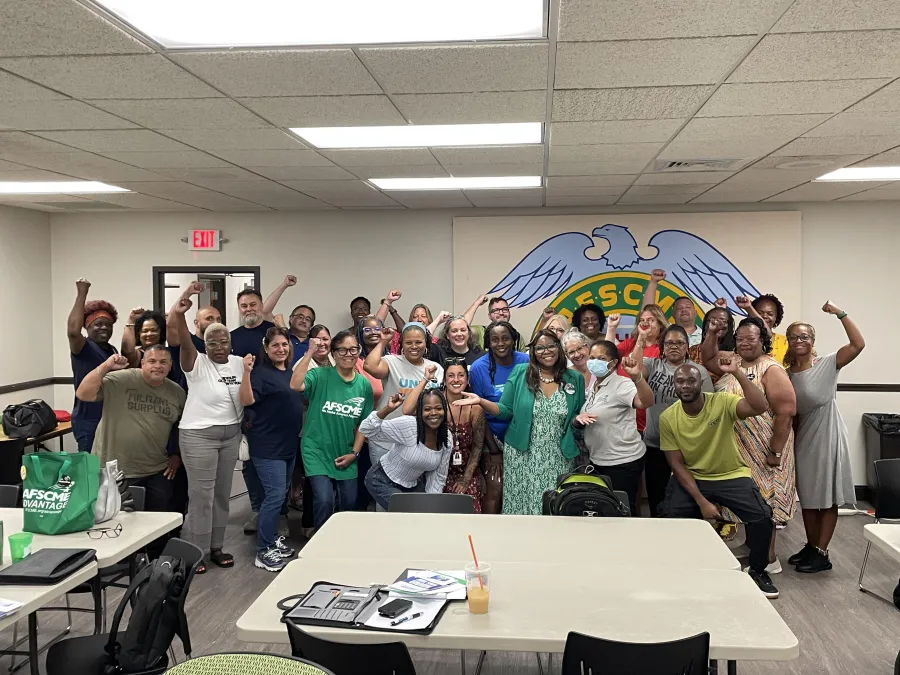Getting Organized: Council 4 members learn how to engage new hires

Council 4 members are getting organized and building power. In September, AFSCME International Union (IU) staff visited Council 4 to run a special training on New Hire Orientations. More than 30 leaders from various locals gathered in New Britain, learning with and from each other about onboarding new hires into our union and effective ways to engage our members. High-quality orientations have proven to increase sign-ups among new hires and bolster their commitment to the union. Committed members are more likely to stand with the union in the face of tough bargaining fights and political attacks. That means Locals can devote more resources to going on offense, instead of wasting precious money and energy shoring up members for defensive fights.
The training began with members taking turns telling stories of how they were each welcomed and introduced to Council 4 after taking their new job. Notably, multiple members highlighted how one-on-one conversations with a leader from their local were instrumental in getting them more involved in our union.
The next part of the training covered Overcoming Objections from coworkers about joining our union or taking part in union activities. Members talked through examples of difficult conversations they needed to have with different coworkers, and everyone in the room offered suggestions on how to respond in different scenarios.
Then, facilitators split the room into breakout groups to tackle concrete questions, such as:
What type of materials should new employees get?
How can we recruit others to help with union activities?
What activities can we plan to welcome new employees?
“We discussed methods to communicate with members, such as email lists, social media, text messaging, newsletters, bulletin boards, websites, and most importantly, in-person communication,” said Rob Raczka, a training participant and Vice President of AFSCME Local 318 (NP-3 State Clerical Administrative). “In this day and age, with more members teleworking, we must utilize all methods to keep our members engaged and maintain communication.”
Rob Raczka, Vice President of AFSCME Local 318, during a breakout (center).
After the breakout groups, each member presented their ideas to the whole room and gathered back together to tackle the last portion of the training: why do we think we cannot reach young workers? Members chimed in enthusiastically and discussed generational cultural gaps, different technological preferences, and ways to address the specific concerns of young workers’ in contract negotiations.
Jazz Coakley, Executive Board member of AFSCME Local 233 (Bristol Town Employees), was one of the youngest members at this training. Since then, she has already gotten two new hires to sign union cards and join Local 233, crediting the many ideas from fellow members at this training, as well as resources from Council 4.
“Firstly, I used the new Council 4 Orientation packet, and I put together welcome bags with our own Local’s pamphlet, the Council 4 membership card, and other union merch like stickers and magnets,” Coakley said. “Secondly, I also used the approach of introducing yourself, asking them who they are, and then inviting them to join our union. I’m not just asking them to join us out of nowhere, but I’m actually getting to know the person, asking them about their previous job experiences, before I educate them about our union.”
Jazz Coakley, Local 233 Executive Board member, speaking at the training.
Coakley has also implemented other engagement tools that members suggested in the training – such as a Local 233 newsletter, monthly social gatherings, member surveys, and a visual identity for Local 233.
“We want to get polos and t-shirts, as well as water bottles, so our members can represent Local 233 wherever they go,” she said. “Our Local has many different departments, which makes it hard to identify our union siblings, so we want to create camaraderie and a shared identity.”
Council 4 members ended the training being energized and ready to organize their coworkers. If you’re reading this and are not an active member yet, get involved to build your union by attending the Council 4 Fall Trainings, such as Direct Action Organizing or Chairing Effective Meetings! Unions are like a gym membership – when members show up and participate, the stronger your workplace and your union becomes!
Join Your Union!
